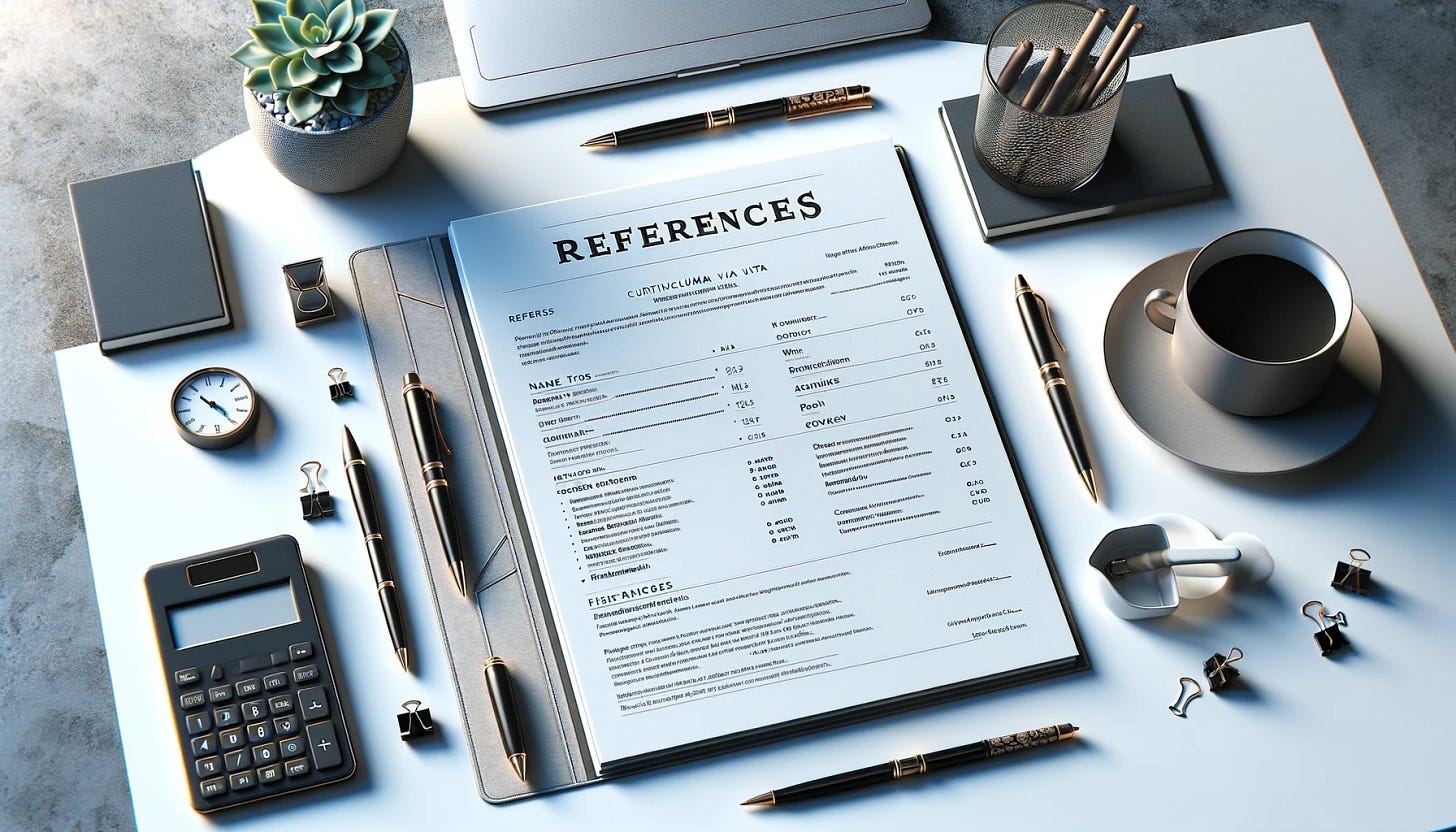Should You List References on a Resume?
Wondering if you should include references on your resume and how it can affect your job application? Let's dive in! Discover the best way to present your references for maximum impact.
As a seasoned recruiter, I thought I'd seen it all - until I started browsing career advice on Instagram. The "tips" being shared by some self-proclaimed experts make me wonder if they're simply trolling job seekers or if they are serious.
The latest example claimed that putting the sentence "references available upon request" on your resume will guarantee no interviews. They called it a resume-killer and advised their audience never to do it. While catchy, this tip is simply a scare tactic with little truth behind it.
While I appreciate a provocative headline, this claim (or what we recruiters call BS) is simply false. Recruiters won't discard a resume just for including that standard phrase.
But the solution offered is truly puzzling. The coach's solution was to create a separate reference list and hand it to the hiring manager during interviews without even being asked for it. Handing over a random piece of paper seems awkward at best, whether via Zoom or in person. Moreover, it's uncommon for hiring managers to call references immediately after their interview.
The moral of the story: always vet who is giving you job search advice. If they lack real-world recruiting experience (like this "guru"), take their tips with a huge grain of salt. Sometimes even a sprinkle of common sense is missing.
While some may be well-intentioned, they don't always translate well in the real job search. Some tips they shared can even hurt your job search big time!
So, when you hear a recommendation starting with "XYZ recruiters want you to know," you'll know right away that recruiters don't want you to know that for one simple reason. It's just a bunch of garbage advice meant to get likes, not to actually help you or other job seekers.
Should You List References on a Resume
We've all been there, tweaking our resumes, trying to make them shine, and then we hit this question: "Should I include references?"
Now, you might have heard different opinions on this: some say, 'Absolutely, list them!' while others suggest, 'Nope, keep them off your resume.' Confusing, right? Well, let's demystify this together.
Remember the time when our parents or teachers told us about their job applications? They probably mentioned including a list of references right on their resumes. But here's the thing – times have changed. Just like how we've moved from handwritten letters to emails, the norms for resumes have evolved too.
In today's digital age, where privacy is as precious as your favorite coffee mug, listing references directly on your resume isn't the norm anymore. It's like giving out someone's contact info without asking – not the best move, right? But don't worry, references still have their place, and they're crucial! It's just about knowing when and how to use them effectively.
The Current Norm: To Include or Not to Include References
Alright, let's dive into the big question: To include or not to include references on your resume? It's like the Hamlet of the job search world, isn't it?
Here's the deal – the current trend is leaning towards a 'no' on including references directly on your resume. It's kind of like showing up to a first date and bringing along your entire family. Overwhelming, right? Your resume is your first impression, and you want it to be about you, your skills, and your experiences.
I remember when I first started job hunting, I was eager to list every person who could say something nice about me. But then, a mentor gave me a piece of advice that stuck: "Your resume is your highlight reel, not your entire backstory."
The thing is, including references on your resume can be a bit premature. Most employers these days expect to see your skills and experiences first. They want to get to know you before they start calling up your references.
Plus, there's a privacy aspect. Imagine if your references started getting calls out of the blue from different companies. They might not be too thrilled about it. It's always better to give them a heads up, which you can't really do if their details are floating around on your resume.
That's exactly why the advice the career coach gave in the video to his audience is not just bad, but actually harmful. Giving references to everyone who invited you for an interview? That's a big no-no.
It's all about timing. Typically, references are requested later in the hiring process, often just before a job offer is extended, to confirm your suitability with previous leaders or colleagues.
Tips for Preparing Your References
Now, let's chat about getting your references ready.
First things first, choosing your references. This isn't just about picking the most impressive names in your contact list. It's about finding people who genuinely know your work and character. A former boss who admired your dedication, a colleague who teamed up with you on a successful project, or maybe a mentor who guided you. These are the folks who can provide real, meaningful insights about you.
I remember when I was applying for my first big job out of college. I thought about listing my uncle because, well, he's family and he thinks I'm great. But then I realized, he's never actually seen me in a professional setting. Instead, I reached out to my internship supervisor, who had closely observed my work for three months. She could speak confidently about my abilities in a way my uncle couldn't.
Now, here's a crucial step – always ask for permission before listing someone as a reference. It's not just polite; it's strategic. You want to make sure they're comfortable advocating for you and that they're not caught off-guard if they get a call. A simple heads-up can also give them time to think about what they'll say.
And when you do reach out, it's a great opportunity to catch up and even remind them of some of your key achievements. I usually send a quick email or make a phone call, saying something like, "Hey, I'm applying for this new role, and I feel your insights could really help. Would you be comfortable being my reference?"
Lastly, keep your reference list updated. Just like your resume, it needs to stay current. Check in with your references from time to time, update their contact details, and keep them informed about your job search. It's not just about keeping the list accurate; it's also about maintaining good relationships. After all, these are the people who are vouching for you – they're a key part of your professional network.
When to Include References
Alright, let's talk about timing. Knowing when to include references is like knowing when to add the secret ingredient to your favorite recipe – it needs to be just right.
Generally, your resume is your solo performance. It's where you shine on your own. But there are times when your backup singers, aka your references, need to step onto the stage. The key is to know when that moment is.
Most of the time, you won't need to include references in your initial application. Interviewers typically ask for references towards the end of the interview process when they see you as a final candidate for the job. This is your moment to hand over your well-prepared list!
Now, there are exceptions. Sometimes, a job posting might explicitly ask for references to be included with your application. When that happens, you definitely want to follow the instructions. Not doing so can be like showing up to a formal event in shorts and flip-flops – it just doesn't fit the occasion.
I remember applying for a position once where they asked for references right off the bat. It felt a bit early, like sharing family stories on a first date, but it was part of their process. So, I included a neat, separate page with my references, following the same format as my resume. It showed that I could follow directions and was attentive to details.
Remember, when you do provide references, make sure they're tailored for the job. If it's a leadership position, choose references who can speak to your leadership skills. If it's a creative role, someone who's witnessed your creativity would be ideal.
How to List References on a Resume
Listing references on your resume is pretty straightforward, but there are a few key things to keep in mind to make sure you do it right. You want to give enough information to pique interest, but not so much that it becomes overwhelming.
Firstly, the format. Keep it consistent with your resume. If your resume is neatly formatted in Times New Roman, don't switch to Comic Sans for your references. It should look like a part of the same package. I usually suggest using the same header as your resume – it gives a professional and cohesive look.
Now, onto the content. For each reference, you'll want to include:
Full Name: This is a no-brainer, but you'd be surprised how often it gets overlooked.
Position Title: What's their current role? This gives context to their relationship with you.
Company: Where do they work now? Again, it's all about context.
Contact Information: A phone number and email address are standard. Make sure they're okay with you sharing these!
A little pro tip: It's always a good idea to briefly mention how each reference knows you. For example, "Former Supervisor at XYZ Corp" or "Mentor from ABC University." It helps the potential employer understand the capacity in which this person has seen your work.
One thing to avoid is overloading your list with too many references. Three to four is usually a good number to list on your resume.
And here's a crucial piece of advice: Always, always check with your references before you list them. It's not just courteous; it ensures they're not caught off guard if they're contacted.
Guide to Improve Your References: Avoiding Common Mistakes
Let's talk about some common pitfalls to avoid so you can tread confidently.
Mistake #1: Listing References Without Permission
Imagine this: You're sitting peacefully, and suddenly your phone rings. It's a call from a company asking about someone you worked with, but you had no idea you were listed as a reference. Awkward, right? Always ask for permission before listing someone as a reference. It's courteous and it ensures they're not caught off guard. Plus, it gives them a heads-up to think about what they'd like to say about you.
Mistake #2: Using Generic Phrases Like 'References Available Upon Request'
This phrase is like a filler in a conversation – it doesn't really add value. It's assumed that if an employer wants references, you'll provide them. Instead of using this phrase, use that precious resume space to showcase more of your skills and achievements. Think of it as choosing to tell an interesting story about yourself rather than stating the obvious.
But if you have it there, nothing would happen, recruiters will just ignore this and it won't cost you an interview, as long as you have the right skills for the job!
Mistake #3: Including Too Many References
More isn't always better. Like over-seasoning a dish, too many references can be overwhelming. Stick to three or four solid references. This shows that you've thoughtfully selected individuals who truly know your work and character.
Mistake #4: Choosing References Based Solely on Their Title
It's tempting to list the CEO you briefly interacted with, but if they can't speak about you personally, it's not very helpful. It's like name-dropping in a conversation – it might sound impressive, but it lacks substance. Choose people who know your work ethic, skills, and accomplishments.
Mistake #5: Not Updating Your Reference List
Your reference list should evolve just like your resume. Keep in touch with your references, update their contact information, and even rotate them depending on the job you're applying for. It's like keeping your professional wardrobe updated – you want it to be relevant and in good shape.
Treat your references with the same care and attention you give to the rest of your job application. Avoid these common mistakes, and you'll be setting yourself up for a smoother journey on the road to your next great opportunity.
Best Practices for Resume References
Keep evolving your reference list as you move forward in your career. Just like you grow and change, so should the list of people who can speak about your journey.
Your job application, with or without references, is a reflection of your professional story. Make it a compelling one. And when the time comes to hand over that list of references, do it with the assurance that these people are ready to back up your story with their own positive experiences of working with you.
Alternative Ways
Alright, let's talk about something that doesn't always get the attention it deserves: the secret reference check. Now, you might be thinking this is out of your hands, but trust me, it can have a big impact on your interview prospects.
So, let me spill the beans on some strategies to handle it and introduce an approach that could totally shake up the whole game for you. These insights will not only strengthen your application but might even make the traditional reference list a thing of the past.





